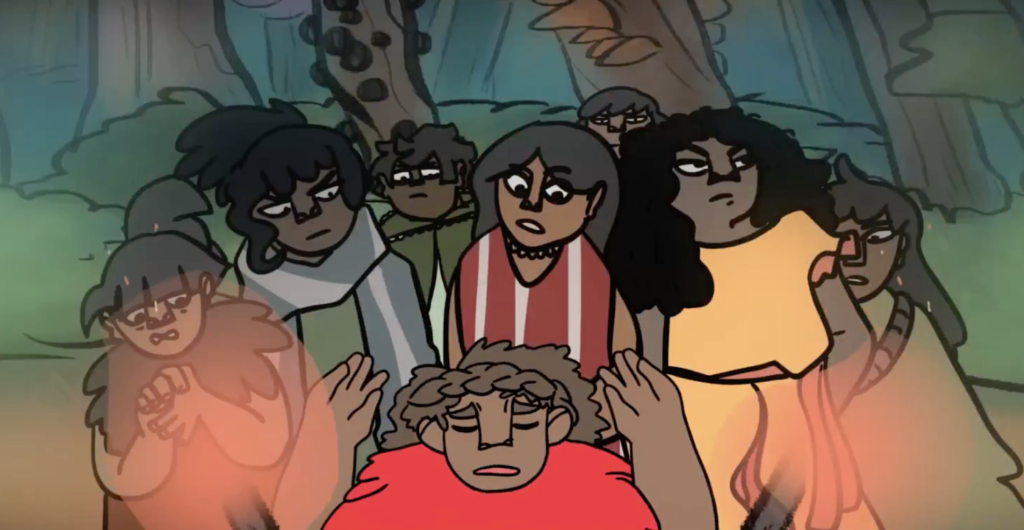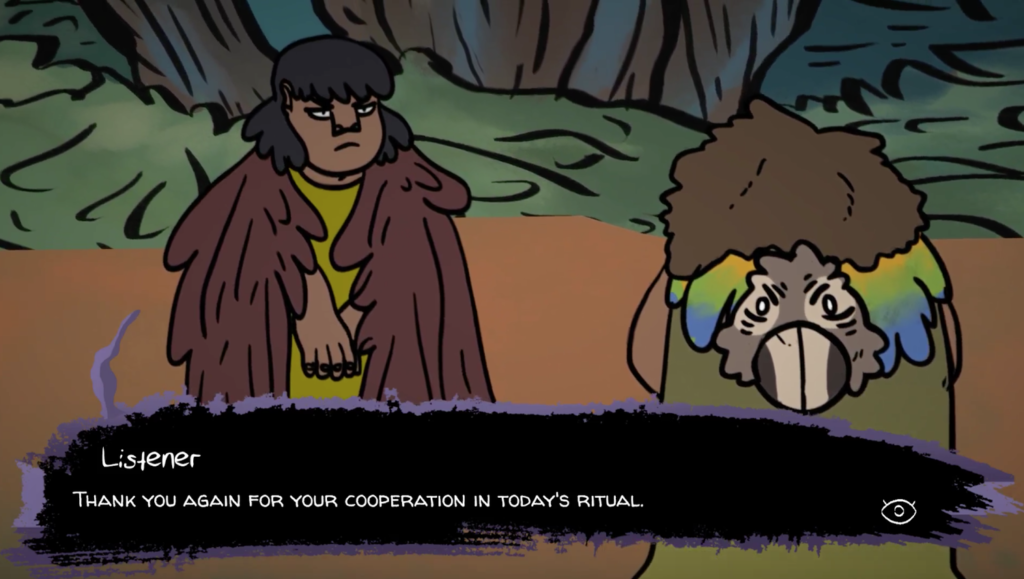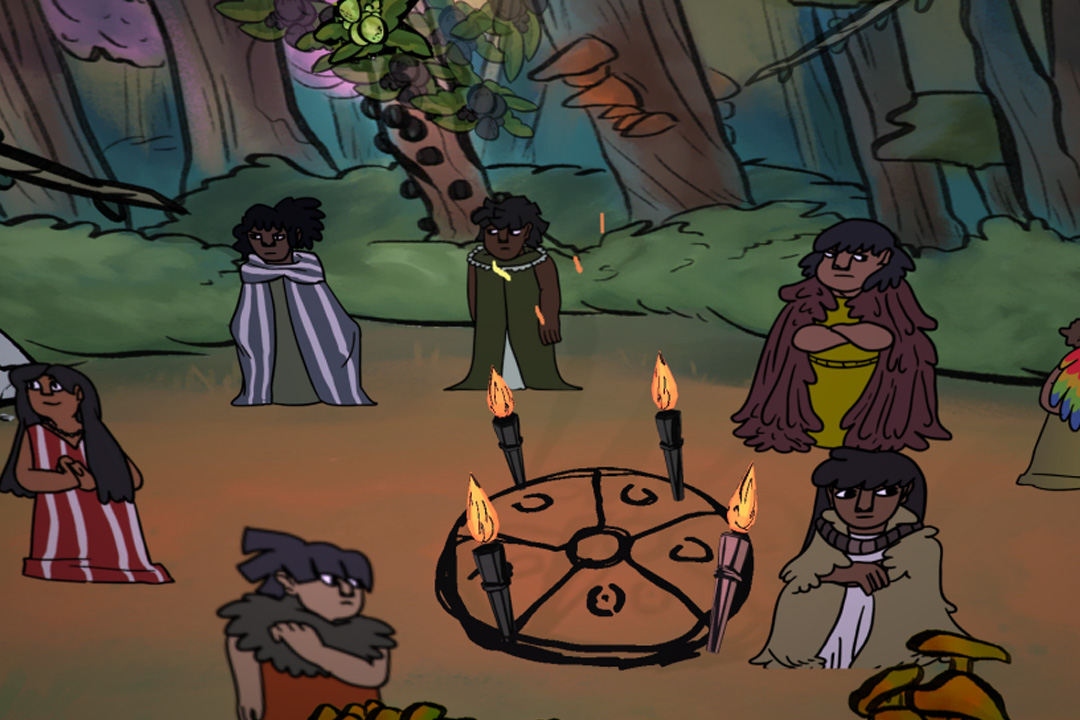Written by Santo Aveiro-Ojeda
In May of 2019, I released DON’T WAKE THE NIGHT under the label Brujeria @ Werk, a project I had been working on and directing since 2017. Talking about it makes that feel very far away, and it still feels weird to think about it nowadays. DON’T WAKE THE NIGHT was a fairly experimental title that merged abstract community politics and stylized art to tell a story about mystery and misunderstandings, but most of all, healing.

Development
With everything technical related to the game, the project took about as long as I expected it to, only a few months longer. The main setback was the limited source of funding—although I am immensely grateful for having received arts funding (Ontario Arts Council and Toronto Arts Council) as it served to pay others for their work, it wasn’t enough to keep us all working full-time on this project. The second part to this was that the game had animated cutscenes, as well as animated sprites, all hand-drawn, which also was the main factor for it taking as long as it did.
The main reason why I went for arts funding rather than commercial funding is that arts funding is a lot more flexible and freeing, although it’s not the large sums commercial funding can get you, but when developing a uniquely Indigenous game, there has to be some sense of autonomy. Arts funding understands the value of Indigenous art and stories, whereas commercial funding prioritizes profits—and therefore often sees Indigenous projects as “high risk.” The second part to this is that with commercial funding (whether it be publishers or private funds), they often set expectations as to what specific quality they’d like to see or what timeline they’d like you to be on. With arts funding this is something more independent—I technically did not meet the timeline that I had given to the OAC originally, but as long as I showed them I made something (even if it’s not publicly available), that wouldn’t reflect negatively on myself as an artist. It’s in the name itself—arts funding is meant to advance culture rather than profit.
I did learn a lot about how I prefer to work and what I would do differently next. For my next projects I definitely wouldn’t do hand-drawn animations again unless I have a larger budget, and I would find other ways to still do animation in a more cost-effective way.
In a more personal sense, I also went through a lot of personal changes between 2017-2019. I experienced a lot of job insecurity due to unemployment, temporary contracts, and other barriers associated with cost of living (especially in a city like Toronto). This also weighed heavily on my mind whenever I worked on my project, and also part of the reason it went a few months over the expected timeline. I’m very grateful for the people I worked with on this project and wished circumstances had been different so I could’ve picked up the pace on my tasks.
Response
This was the first game I was truly officially releasing, rather than it being a smaller game I spent a weekend on that happened to catch some attention. I went through the motions of contacting some press for coverage, and was pleasantly surprised to see it covered in other outlets I hadn’t reached out to (like Kotaku).
There were a couple of hiccups at launch, primarily a bug that broke the build. This was eventually fixed thanks to the help of my friend Llaura (who runs DREAMFEEL out of Ireland). After this I was able to show it at some more events (like imagineNATIVE) and sifted through more individual positive reactions–I’m very shy when it comes to searching for this feedback, so I found most of it months after launch.
Overall the response was quite positive, even though the launch had been quite small and only to itch.io.
Reflecting on Themes
The toughest thing to develop in this project was a sense of moral ambiguity. I didn’t want the player to feel like there was a “side” to take, but rather characters to observe and validate.
In communities, both in the more social sense as well as in distinct traditional Indigenous (Guarani in this case) communities, judgement is something that shouldn’t be a binary of “good” vs. “bad.” In Guarani values in particular, your community isn’t there to punish you for being “bad” but rather to guide you to a healing journey. Especially when we consider how Catholic values of “good vs. evil” were forced onto Indigenous peoples, empathetic and honest community healing becomes even more important.
Part of the reason DON’T WAKE THE NIGHT has an ominous and foreboding atmosphere is because of the fact the characters are technically doing something that is wrong, but they are not evil or bad for doing it, mainly misguided and confused. These are characters who have made mistakes, but still have the chance to mend their relations before it’s too late. In colonized mindsets when we think of “punishment” we think of jails, fines, and other such regulations that only further oppress the most disadvantaged. Since DON’T WAKE THE NIGHT takes place in a fictional world free of colonialism, the main obstacle these characters face is a unique one: they don’t know what punishment is, and are at a crossroads of deciding whether or not they will have to figure out what “punishment” is.
Another layer to this story is the fact that contacting spirits to resolve human conflict is a strictly forbidden practice in general Guarani worldviews. Spirits are there to influence things humans cannot control, one main one being the weather. To ask a spirit to act as a mediator would only further upset them, potentially turning them into an “evil” spirit (one that is not interested in helping humans, generally referred to as aña).
Taking all this into account, developing the script took some fine-tuning. I wanted to give the audience enough context so they could understand the most basic information: the setting, the conflict, and the characters–without favouring one over the other or casting one as “good” or one as “bad.”
I was also initially inspired to dive into this theme after doing community work myself, and realizing the complexities of tending to community members’ concerns but realizing it’s not possible to make everyone happy.

Conclusion
I still look quite fondly to DON’T WAKE THE NIGHT as a more experimental project, but recently decided to post it to Steam (now available) in efforts for it to find a new audience and newer community. I want to keep pushing and challenging myself as well as other developers to make games that break out of a binary of good vs bad and right vs wrong. If you truly want a player to feel like they have engaged with the narrative positively, it means letting them come to terms with their own choices, rather than pre-determining whether something is “bad” or “good.” Community is what keeps us alive, and what keeps us together.
